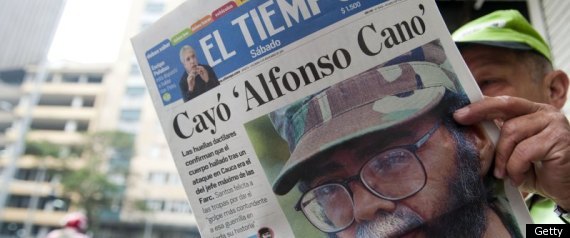FARC Leadership: Stronger than a House of Cards

On November 4, 2011, the Colombian military launched a successful raid that resulted in the death of the commander-in-chief of the Revolutionary Armed Forces of Colombia (FARC), Guillermo León Sáenz Vargas, better known as Alfonso Cano. Responding to the death of the leftist group’s leader, Colombian president Juan Manual Santos asserted that the FARC’s “leadership will come down like a house of cards.” Despite this optimistic declaration, the FARC’s leadership might prove to be stronger than cards. One day after Cano’s death, the Secretariat, a seven-member group of senior FARC leaders, unanimously elected Rodrigo Londoño Echeverry, known as Timochenko, to take over command of the group.
For forty-seven years, FARC guerrillas have been challenging the Colombian government. While the left-wing group’s power is not now what it used to be during the 1980s and 1990s, it still presents a major security challenge for the Colombian government. Currently, the FARC, with its active forces numbering an estimated 9,000 members, has re-adjusted its tactics to focus on hit-and-run ambushes.
The death of Alfonso Cano signifies a distant victory for the Colombian government because he is the first FARC commander-in-chief to be killed in action; the previous transition of leadership in 2008 occurred when the former commander-in-chief and historical founder of the FARC, Manuel Marulanda, died of a fatal heart attack. The government believes its active role in killing Cano will deal a major physiological blow to the rebel group. However, the loss of the previous leader will not be as definitive as some of Santos’ comments suggest. The political structure of the Marxist-leaning group is designed to adapt to the need for leadership changes. Dana Brown, Executive Director at the U.S. Office on Colombia, points out that the FARC has endured deaths of important FARC members before such as Marulanda, Ivan Rios, Raul Reyes and Mono Jojoy.
The Secretariat’s speed in selecting Timochenko as the new leader exemplifies the field capabilities at the highest levels of the FARC. Antonio Lopez, the president of Corporación Acro Iris, a non-profit organization that focuses on the Colombian civil conflict, states that the successful transition of leadership “does represent a sense of continuity in the FARC. We’re not going to see them breakdown and negotiate over Cano’s body. At least not anytime soon.”
The selection without incident of a new hardliner leader, is entirely undesirable for Bogotá, although it remains a good sign for the FARC. Timochenko, trained in Cuba and Russia, has committed his entire adult life to the organization. After joining the FARC in 1982, he rose quickly through the ranks and in just four years became a member of the Secretariat. The new FARC leader has more than one hundred arrest warrants issued against him for brutal human rights abuses, including acts of terrorism, kidnapping, murder and forced disappearances.
For the Colombian military, Timochenko may prove to be a more difficult target than Cano. Timochenko bears the reputation as one of the least known members of the Secretariat; he grants almost no media interviews and did not participate in peace talks between the Colombian government and the FARC in the 1980s and 1990s. Before his new appointment of commander-in-chief, Timochenko was in charge of a group of 800 rebels near the Venezuelan border and headed the intelligence and counterintelligence for the FARC. The new leader has a huge collection of informants reporting to him, which has contributed to his success in evading capture. The United States is offering a reward of up to USD 5 million for information that could lead to his detention.
Santos has called for Timochenko to surrender or face the same fatal end as Alfonso Cano. In a speech on November 16, 2011, Santos directed his thoughts toward the new leader, “I want to take this opportunity to tell the number one of the FARC to reflect that politically, they’re defeated.” Regardless of the President’s upbeat rhetoric, the FARC has appeared to effectively make the transition, a testament to the structural strength of the organization. Cano’s death remains, however, a triumph for the Colombian military and government. They are still realistically far away from bringing down Timochenko, let alone the entire FARC.

